Mieriem Abdullaieva: “Language is always an indicator of your identity”
22 / 04 / 2025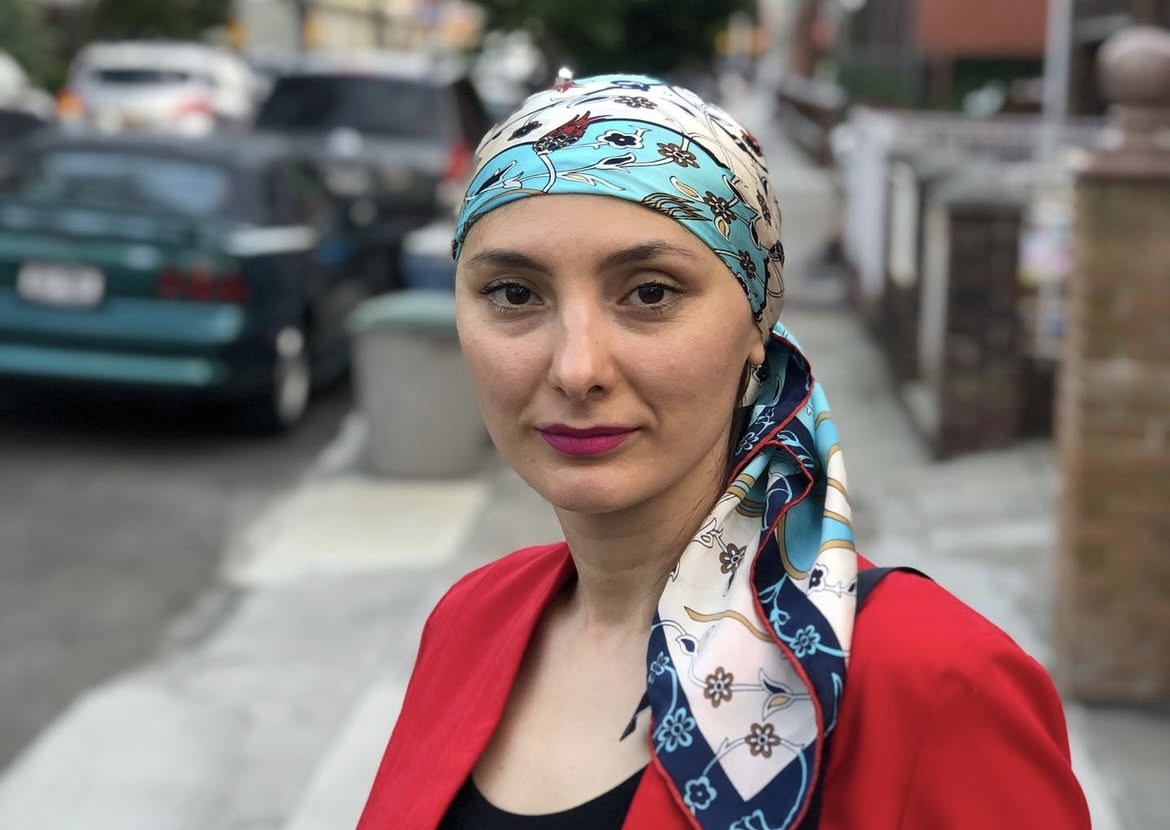
Imagine for a moment that you suddenly became enemies to those around you, you were deprived of your home and forced to leave your native land at gunpoint. You have lived abroad for many years with the hope that you will someday return home. Finally, you return, and there are strangers managing your yard, and all that is left to do is leave. You finally settle in your homeland, but you are still considered enemies, so you have to prove to everyone every day that this is not the case. But after a few decades, it all happens again and you are forced to flee again to save yourself and your family…
This fate befell many Crimean Tatars, including the family of Mieriem Abdullaieva who shared her story with us.
Mieriem is a Crimean Tatar. In 1944, her family was forcibly deported. She was born in Crimea, but she lived in the Kherson region, close to the Peninsula. As a schoolgirl, Mieriem was bullied by both her peers and teachers due to her ethnicity.
Today, together with her husband Denys, she is developing the platform “Qırımtatar Tili” – a resource for learning the Crimean Tatar language, which at the same time opens the door to the culture and traditions of the indigenous people.
Read in this interview about how the experience of the family of Mieriem turned into a mission to spread the language and culture of the Crimean Tatars.
Mieriem, how you would describe yourself today?
I see myself as a person who popularizes knowledge about the Crimean Tatars. Unfortunately, this topic is very little known among Ukrainians.
If you ask people what associations they have with Crimea, or tell them that you are a Crimean Tatar, the person usually starts listing places where they vacationed in Crimea, or where they ate chibereks, or something similar. These are very banal everyday things. For us, it’s more than just a vacation.
Resting at resorts where Ukrainians rest is a luxury for Crimean Tatars, because people returned from another country to which they were sent, could not register, could not find a job, could not build a house, could not learn the Crimean Tatar language at school.
For example, the first school where the Crimean Tatar language was studied was opened on the Peninsula only in 1993. Ukraine gained independence in 1991, Crimean Tatars began to return en masse, and only in 1993, under pressure from the Crimean Tatar community, did the first school open. I mean, no one was just going to open it easily.
And by 2014, there were about 16 schools on the Peninsula where one could study the Crimean Tatar language. Can you imagine the size of Crimea? If there are about 600 schools there, then 15 is very few. Therefore, how many people could learn Crimean Tatar? By the way, the number of these schools has decreased under occupation to 7.
“It’s just a paradox – buying your own land that was taken away”
After the deportation of Crimean Tatars in 1944, many of them were unable to return home, so they were forced to build a life outside the Peninsula, mainly in southern Ukraine. Unfortunately, this also affected your family. What role did deportation play in your life?
Deportation affected my family too. My grandparents and their families were forcibly evicted from Crimea as children. Some of my relatives did not survive. Those who survived established themselves in a foreign land and only then were able to return.
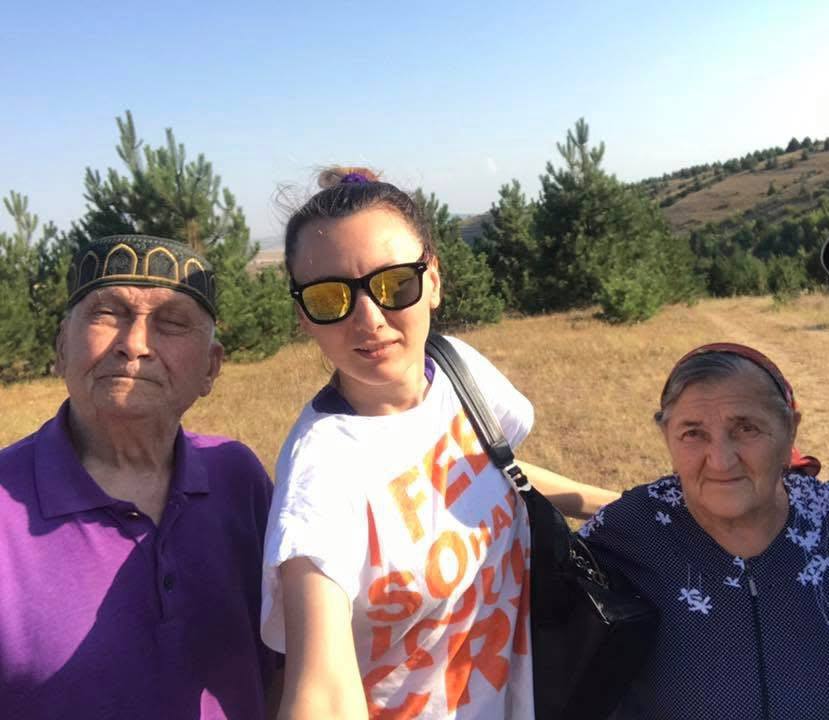 Mieriem with her Grandfather Abdulvait Aliiev and Grandmother Riesmiie Abdullaieva. Photo provided by Mieriem.
Mieriem with her Grandfather Abdulvait Aliiev and Grandmother Riesmiie Abdullaieva. Photo provided by Mieriem.
My parents were born in deportation, in Uzbekistan, returned to Ukraine and tried to build a life in an independent country. I was born in Crimea, but Crimean Tatars were not allowed to buy land on the Peninsula. It’s just a paradox – buying your own land that was taken away. That is, not everyone was able to purchase a plot of land to build a house.
My maternal grandparents bought a house, but they weren’t registered there, and that was a very big problem. So, my parents started looking for a place where they could buy a house. And a certain number of Crimean Tatars settled in the South of Ukraine, close to Crimea. These are the Kherson region, Mykolaiv, Odesa, and Zaporizhzhia. Few people know, but the Crimean Tatars had their own very powerful state, which was called the Crimean Khanate. It occupied the territory of Crimea, the steppes of the Northern Black Sea region between the Danube and Don rivers, as well as the lands of the northern Kuban.
So, we were able to settle within the borders of our ancestors’ state. Now the territory where my family settled in the 1980s is occupied. This is the Kherson region. And this is a very painful topic for me.
“Crimean Tatars have struggle in their genes”
You said you were born in Crimea, but lived in the Kherson region. However, every other post on your social networks is about Crimea, the Crimean Tatar language and culture… So, what does this corner of Ukraine mean to you?
Crimea is my homeland; it is the place where I was born.
Many of my peers of Crimean Tatar origin were born outside Crimea. Most of the children were born after the declaration of Ukraine’s independence, when the deported people were just returning to the Peninsula.
Part of my family returned to Crimea in 1977, but the repressions were still ongoing – people were being evicted again and again. My grandmother, Musfire, who is no longer living, was part of a delegation that travelled to Moscow in 1977-78 to raise the issue of the return of the Crimean Tatars to their homeland and granting them rights.
She went there, not my grandfather, Abdulvait, because men were immediately sent to prison, to camps. Therefore, he stayed in Crimea with 5 children. Grandma went as part of a women’s delegation because people thought they would be more loyal to women. Of course, they (women) were heard there, but they were all deported to Uzbekistan again. So, my grandmother was deported again and only then, after some time, was she able to return to her family.
My mother and family wanted me to be born in Crimea. And it has happened that my mother was on the Peninsula on the day of my birth, so it was something significant. However, my parents were unable to settle there and were forced to look for housing elsewhere. We settled in the city of Henichesk, Kherson region. It’s only 40 kilometres from Crimea, so we went there to visit our relatives almost every month.
Crimea is my place of strength. And now, when people say that this is an occupied territory, for me the word “territory” is something so “cold”. This is not a territory – this is my home, this is my place of power.
My other grandmother, Riesmiie, recently turned 90. She was deported from Crimea at the age of 9. Only at the age of 45 was she able to return to Ukraine from Uzbekistan. The occupation of the Peninsula has been lasting for 11 years and I wonder if I will have to wait as long as my grandmother did to visit Crimea again.
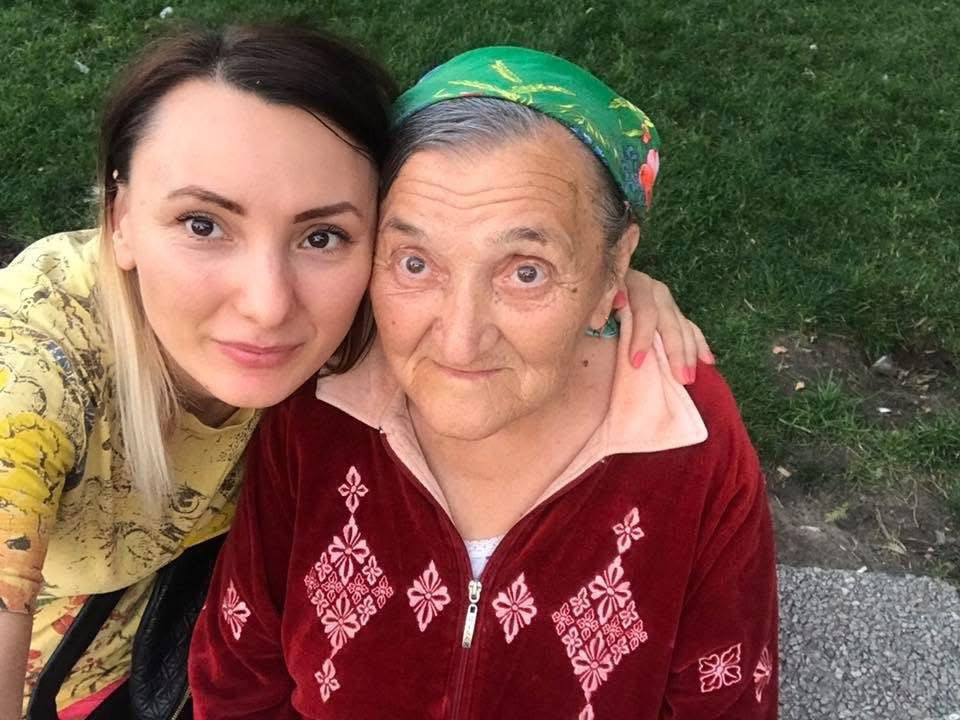 Mieriem with Grandma Riesmiie. Photo provided by Mieriem.
Mieriem with Grandma Riesmiie. Photo provided by Mieriem.
But you know… Crimean Tatars have this struggle in their genes.
“When you walk on this land, you understand that your grandparents suffered to return here”
Where were you when the occupation of Crimea began in 2014?
I lived in the city of Dnipro at that time. It was very painful to watch what was happening…
Since then, since the occupation, I have been to Crimea twice. The first time was in 2015. Getting to the Peninsula was very difficult back then. I was detained at the border, which came as a surprise to me. We still didn’t really understand what the russians were capable of, how they could bully people who went to Crimea with a Ukrainian passport.
They said that my Ukrainian passport was not valid and demanded that I provide a foreign passport, which I did not have. It’s very funny, because I didn’t go abroad at the time and was in my own country. I was travelling to Crimea knowing that it was my country, but then I realized that it was no longer so…
This situation was very unpleasant. We were held at the border for 5 hours. It was winter, there weren’t many cars crossing the border. The border of Crimea with the Kherson region is actually a steppe. And it was on New Year’s holidays, and it’s very cold in the steppe at this time of year. I was with my parents, brother, and grandmother. Both my passport and my grandmother’s indicated that we were born in Crimea. This “triggered” the russian border guards – the fact that we didn’t we have russian passports.
They didn’t touch my grandmother because she was old, but they picked on me. They said they would let everyone in except me. That is, they wanted me to stay in the steppe and walk home, because this border is not in a settlement. Of course, my family wasn’t going to leave me there and didn’t leave without me. And after five hours of talking with the occupation border guards, they let us through. But they said they made a note in their system that next time they would not let me into Crimea without a passport for travelling abroad.
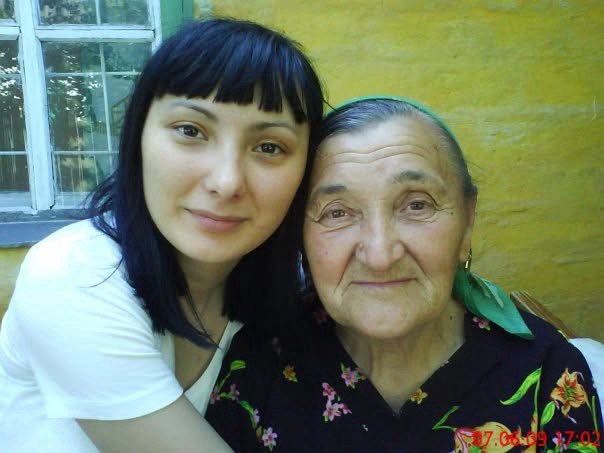 Mieriem with Grandma Riesmiie. Photo provided by Mieriem.
Mieriem with Grandma Riesmiie. Photo provided by Mieriem.
I went to the Peninsula for the second time in 2017. I was very worried. But I didn’t take my passport for travelling abroad with me – it was a matter of principle. But then everything went more or less normally.
That year was the last time I saw my grandparents alive because of the occupation. They were deported as children and worked so hard to return to Crimea. They would not leave under any circumstances. This is the main reason why Crimean Tatars do not leave Crimea. Because they had such a hard time returning there that they can’t leave everything behind, especially the older generation.
My grandfather was even able to return to his village from where he had been deported. Not immediately, of course. At first, my grandparents tried to buy land in a city, but it was not allowed in cities even more. That is, it was not allowed everywhere, but some people, mainly in villages, still sold their houses.
Grandfather bought a house in one village, but after a few years his dream came true and he bought a plot of land in the village where he was born, raised, and from which he was deported. That’s why Crimea is something so special for me. Even when you walk on this land, you understand that your grandparents suffered for this. Just to come back here.
I remember one moment… When I was 3 or 4 years old, my grandmother and I went to the village where her house was. We weren’t allowed inside because people who got the house for free lived there.
And then, as a child, I asked: “If this is our house, why can’t we go in there?” Of course, my grandmother didn’t have an answer to this question. As I got older, I began to research history more, to understand how it all happened, what the consequences were.
“When we crossed the “border” with Crimea, we felt an atmosphere of quiet terror”
And when we went to Crimea for the first time after the occupation, what did you feel?
On the one hand, I couldn’t believe that this had happened, that there was a border in this steppe that had never existed. We lived very close to the border with Crimea created by the occupiers. I’ve driven this road hundreds of times, and when I saw this border in the steppe, it was like some kind of fantasy, like in a terrible dream. It seemed like it was all going to disappear somewhere. It was impossible for that to be like that. And on the other hand, when we crossed the border, we felt an atmosphere of terror, a kind of quiet terror. You can’t say anything, you can’t express your opinion, there is no right to vote there. It’s a grey area, a black hole.
Since after 1944 Crimea was populated mostly by people from russia, the occupation of the Peninsula was like their golden age. After all, when the Crimean Tatars returned from exile in the 1980-90s, no one was happy that they were returning and would claim something, because people had a settled life.
And after 2014, the people who lived there were happy because they could oppress the Crimean Tatars again and send them away, expel them, tell them to go to their homeland in Uzbekistan or Tatarstan or somewhere else. Propaganda works very well. I want to say that you really can’t put all blame for this propaganda only on the russians.
It wasn’t that before 2014, Crimean Tatars were treated well, and after 2014, they weren’t treated well. This is not true. There is no black and white here, because as someone who was born and raised in Ukraine, I have experienced a lot of bullying due to my ethnicity.
This is something that we will have to work with in the future, because Ukrainians still need to accept that they are not alone in Ukraine. There are also indigenous peoples. I am glad that in 2021 the existence of these indigenous peoples was recognized – these are the Crimean Tatars, Krymchaks, and Karaites.
They have always been on the territory of Ukraine, they were formed here, and they lived here. They shall be entitled to be on the territory of Ukraine.
“Sometimes it seems to me that as a Crimean Tatar, I hate russians more than some Ukrainians do”
You said you were bullied because of your ethnicity. What was your experience?
Yes… This is a painful issue for me, as insults poured in my direction from both classmates and teachers. On the part of the children – because their parents shared information with them that the Crimean Tatars had supposedly come and seized the lands, that they were killing people. They insulted me because my skin was darker than Ukrainians should have, although this is, of course, very strange now, but there was a lot of bullying about my appearance, about the fact that we have a different faith.
The last time I was sent to Tatarstan or Uzbekistan, or asked where I came to Ukraine from, was in 2022. Even before the full-scale invasion began, a person wrote such a comment to my post on Facebook. Thus, these sentiments are largely present among Ukrainians, because this rejection of other religions and people of other ethnic origins still exists.
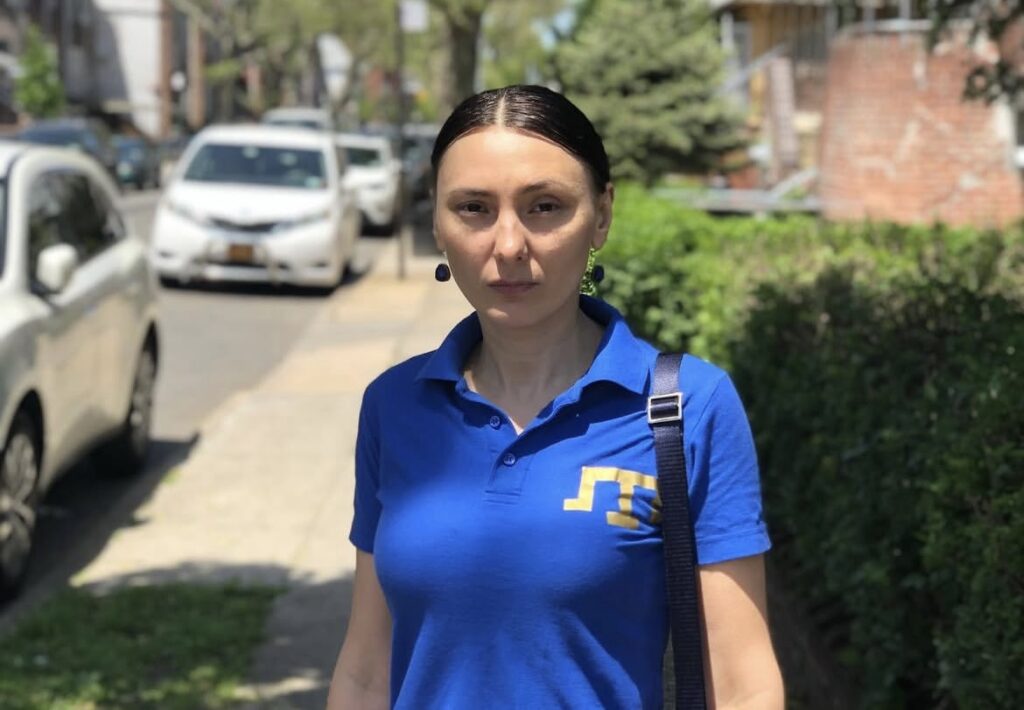 Photo taken from social media page of Mieriem.
Photo taken from social media page of Mieriem.
It is very fashionable now to support the theory that in Ukraine everyone is treated equally, there is no prejudice, that russians are bad and only they are prejudiced against different peoples. However, Ukraine has it too. We will not talk about russians at all – they are inhuman.
Crimean Tatars have a genetic hatred of russians, because russians are the russian empire that annexed Crimea, the Soviet government that deported the Crimean Tatars in 1944. And also, the fact that Crimean Tatars sympathize with russia is a myth.
Sometimes it seems to me that as a Crimean Tatar, I hate russians more than some Ukrainians do. For example, those who still speak russian or listen to russian songs.
“There were times when I was asked which side my brother was fighting on – the russians or the Ukrainians”
You currently live abroad. Did you leave after the full-scale russian invasion of Ukraine?
I left long before the full-scale invasion, in 2017. But, of course, my thoughts are in Ukraine, because my parents are there. My brother serves in the Ukrainian armed forces, was seriously injured, recovered, and returned to the front.
There were times when I was asked which side my brother was fighting on – the russians or the Ukrainians. This just annoys me. It’s all the same question of whether Crimean Tatars sympathize with russians.
Many Crimean Tatars are fighting in the ranks of the Armed Forces of Ukraine. And many don’t advertise this, because they have families in Crimea.
“I wanted the Crimean Tatar language to be accessible to everyone”
How did the idea of creating a platform for learning the Crimean Tatar language come about?
When the Crimean Tatars returned to the Peninsula, they were unable to learn their native language. The few schools that opened could not meet the demand of everyone who wanted to study it.
Not to mention the times when Catherine II annexed the Peninsula and many people left, when the Soviet authorities shot the intelligentsia in the 1930s. Thus, prominent art connoisseurs, historians, writers, and ethnographers were shot. Those people who could have enriched our culture were shot. Then came 1944 – the mass deportation of Crimean Tatars.
And, for example, my grandparents, their peers, were deported while still in preschool age. And so, they and their parents found themselves in Uzbekistan, Siberia, Tajikistan… That is, these children did not study the Crimean Tatar language, they only heard it.
The Crimean Tatar language was banned during deportation, and it was not allowed to be studied. The Soviet authorities hoped that the Crimean Tatars would assimilate with the Uzbeks due to their common religion. They hoped to destroy us as a nation. But still, people tried to publish some unofficial literature and distribute these copies.
That is, all those people, including my parents, were also unable to acquire knowledge of the Crimean Tatar language. Their language is spoken. They heard it from their parents, and they heard it from their parents. And when they returned, we also didn’t have the opportunity to study Crimean Tatar. As a child, I didn’t understand how important it was.
I remember that in the city of Henichesk, Kherson region, where my family settled, there were 100-200 Crimean Tatar families. That is, not many at all. And the parents themselves raised money to create language learning courses. There were no professional teachers, just one of the parents reading us a primer. But they rented a classroom at the school to hold classes in the evening after school.
There were children of all ages there. But it lasted about half a year, because learning any language without state support is impossible. I mean, possible until people have no money to do it.
Therefore, I also only have knowledge of the spoken Crimean Tatar language. I couldn’t read or write. And when I was looking for a tutor as an adult, there was another problem…
The Crimean Tatar language is currently based on the Latin alphabet. The Soviet government forcibly transferred many languages into Cyrillic, which distorted pronunciation and hindered their development for a long time. Crimean Tatars tried to officially switch to the Latin alphabet back in the 1990s, but the state did not support this.
Therefore, the Latin alphabet was approved only in 2021. And so, when I was looking for tutors, I couldn’t find someone who would teach me how to write in Latin, because everyone was using Cyrillic. And I just have a genetic dislike for the Cyrillic alphabet, which distorts the language.
Therefore, I did not have the opportunity to study Crimean Tatar. A few years ago, courses for those interested just started appearing. I signed up for online courses at the Ukrainian Catholic University (Lviv), and later took courses at the Tauride National University named after V.I. Vernadskyi (Kyiv).
People began to learn the Crimean Tatar language. I wanted this language to be accessible not only to people who take courses and pay money for it. I wanted us to have something like Duolingo, or another resource where a person could learn a language on their own. That’s how the idea to create it came up.
“When people don’t know, they are hostile”
The Crimean Tatar language is the key to the culture of the Crimean Tatars. And you have a lot of articles on your website about the culture of the Crimean Tatar people. So, maybe you have a bigger mission than spreading the Crimean Tatar language?
Yes, you pointed that out very aptly. Because what is a better way to learn a language than in the context of culture? That’s why I didn’t want to create something like a regular Duolingo, where there’s only grammar.
I realized that people still need to be given context. If Ukrainians or people of other nationalities study the Crimean Tatar language, they need to know about the culture, history, and art. And so, we began attracting those who wanted to write articles about this on our platform.
We have historians, cultural popularisers, people who wrote about the coffee traditions of the Crimean Tatars, about history, about the renaming of cities in Crimea, what happened after the deportation of 1944…
And the mission is still to provide knowledge and, perhaps, make people fall in love with this culture. Because when people don’t know, they become hostile.
When you start talking to a person, telling them some personal stories, they start looking at you differently. Of course, if a person is at all ready to accept this knowledge.
And for Ukraine, it seems to me that the presence of such a unique Turkic culture on its territory is such a plus. Because the Turkic culture, to which the Crimean Tatars belong, is a big world of other countries that also speak Turkic languages. These are Kazakhstan, Uzbekistan, Tajikistan, Turkey and other countries.
A library with scanned textbooks, fiction, poetry, and folklore has also recently appeared on our platform. And this opens up broader prospects for people to get acquainted with Crimean Tatar literature. In fact, there are already translations of some works, if people are interested in Crimean Tatar writers; there are also translations of works by Ukrainian writers into the Crimean Tatar language. So, it’s a mutual exchange.
“There is an opportunity to learn the Crimean Tatar language, but it is a drop in the ocean”
This is a great initiative! It really makes people much more interested in learning a language. How did you recruit a team of teachers?
This is not a team of teachers who work directly with us – we have created an open register of teachers whom anyone can contact independently. The situation with the Crimean Tatar language is difficult: there are very few teachers, and most of them remained in the occupied Crimea. Therefore, finding a specialist is not easy, and we decided to help by gathering contacts in one place. These are the teachers who agreed to post their data and contacts. There are also several university lecturers there.
Currently, the Crimean Tatar language can be studied professionally at two universities – the Taras Shevchenko National University of Kyiv and the Taurida National University named after V.I. Vernadskyi, which was temporarily moved from Crimea to Kyiv after the occupation. There is an opportunity to learn the Crimean Tatar language, but it is a drop in the ocean.
We have a critical shortage of teachers. There are so few of them that most are forced to work with groups because it is physically impossible to reach everyone individually.
“Language is always an indicator of your identity”
Why, in your opinion, are the occupation authorities in Crimea currently trying to suppress the Crimean Tatar language?
Because language is always an indicator of your identity.
The occupation authorities are hindering this progress of the Crimean Tatar language. Now a situation has arisen where in the territory of occupied Crimea all books are printed in Cyrillic, and in the territory of free Ukraine – in Latin. And development in this direction is going on.
The occupying power does not allow political prisoners to speak their native language because this is how they express their identity. In addition, the occupation authorities need translators to understand them. Here we can recall Lina Kostenko with her prophetic words that nations do not die from a heart attack, they first lose their language.
It means that language is one of the main indicators of human identity. It all starts with language.